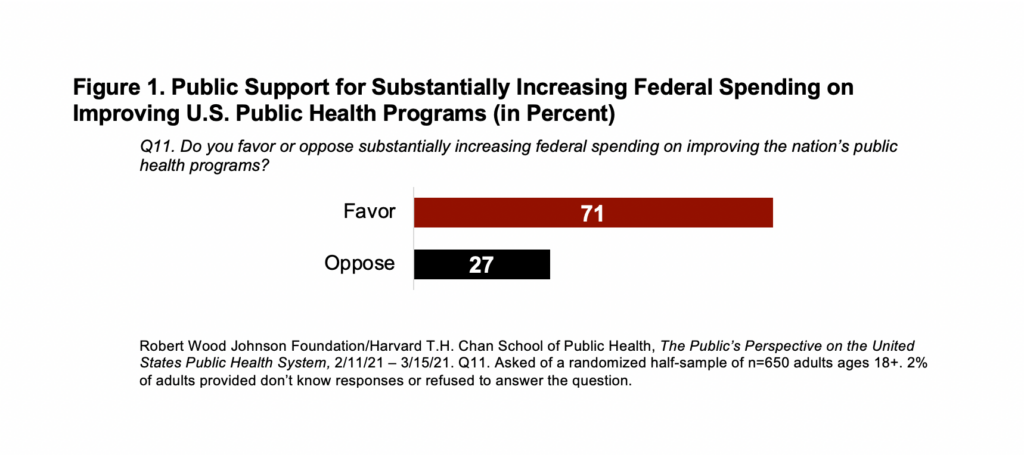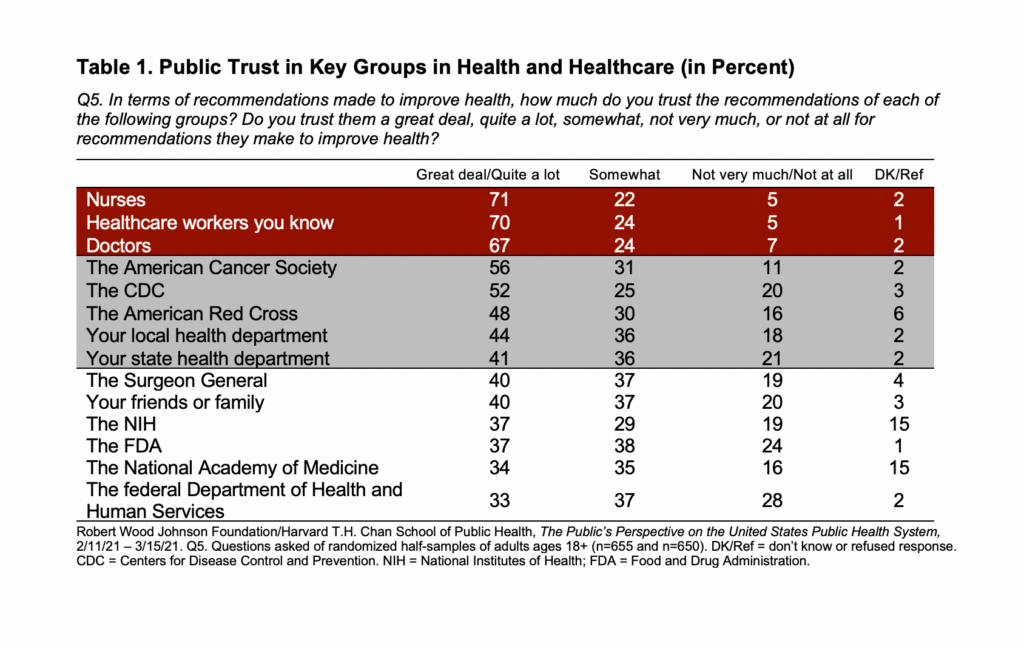Poll: Public supports substantial increase in spending on U.S. public health, but has concerns about how the system functions now

Public trust in healthcare workers is higher during this time than trust in public health institutions, including the CDC, FDA, and NIH
For immediate release: May 13, 2021
Boston, MA – According to a new Robert Wood Johnson Foundation/Harvard T.H. Chan School of Public Health poll, in the middle of the Covid-19 pandemic, a large majority of the public (71%) favors substantially increasing federal spending on improving the nation’s public health programs (see Figure 1).
In addition, a similar share of the public (72%) believes the activities of public health agencies in the United States are extremely or very important to the health of the United States.
This poll, The Public’s Perspective on the United States Public Health System, was conducted February 11 – March 15, 2021, among a nationally representative, probability-based sample of 1,305 adults ages 18 or older. The margin of error at the 95% confidence interval is +/- 3.6 percentage points. See the Methodology below for further details.
When it comes to trust, the public trusts healthcare workers more than U.S. public health institutions and agencies for recommendations made to improve health (see Table 1). This includes high public trust (percent saying “a great deal” or “quite a lot”) in nurses (71%), healthcare workers you know (70%), and doctors (67%) for recommendations they make to improve health. The public has lower levels of trust in the Centers for Disease Control and Prevention (CDC) (52%), state (41%) and local (41%) health departments, the National Institutes of Health (NIH) (37%), and the Food and Drug Administration (FDA) (37%).
At the same time, only about one-third of adults (34%) give positive ratings of the nation’s system for protecting the public from health threats and preventing illness, down from 43% in 2009. By contrast, public confidence in the nation’s medical system has increased during the Covid-19 pandemic, with about half of adults (51%) giving it a positive rating in 2020 compared with pre-pandemic measures in both 2009 (36%) and 2019 (36%) (Gallup; see reference in the Methodology).
“We appear to be entering a new era for public health, with widespread recognition of the critical importance of public health agencies and broad public support for substantially more funding. But success here requires increasing public trust in public health institutions and the perceived performance of these agencies,” said Robert Blendon, co-director of the survey and Richard L. Menschel Professor of Public Health and Professor of Health Policy and Political Analysis Emeritus at Harvard T.H. Chan School of Public Health.
“Our nation’s public health system entered the pandemic underfunded and understaffed—problems that have persisted for generations—and the consequences of this underinvestment over the past year have been devastating,” said Richard E. Besser, president and CEO of the Robert Wood Johnson Foundation and former acting director of the CDC. “It is heartening that a strong majority of the American public supports substantially more public health funding, which will put us in a better position to prepare for and respond to future health emergencies. Public health must also use this moment to commit to addressing the systemic challenges to improved health and well-being—including structural racism and discrimination—that continue to consign too many people of color in this country to shorter, sicker lives.”
View the full report.


Methodology
This poll is part of an on-going series of surveys developed by researchers at the Harvard Opinion Research Program (HORP) at Harvard T.H. Chan School of Public Health in partnership with the Robert Wood Johnson Foundation. The research team consists of the following members at each institution.
Harvard T.H. Chan School of Public Health: Robert J. Blendon, Professor of Health Policy and Political Analysis, Emeritus, and Executive Director of HORP; John M. Benson, Senior Research Scientist and Managing Director of HORP; Mary G. Findling, Assistant Director of HORP; Chelsea Whitton Pearsall, Research Coordinator.
Robert Wood Johnson Foundation: Carolyn Miller, Senior Program Officer, Research-Evaluation-Learning; Jordan Reese, Director of Media Relations; Martina Todaro, Research Associate, Research-Evaluation-Learning.
Interviews were conducted by SSRS of Glen Mills (PA) via telephone (including both landline and cell phone) using random-digit dialing, February 11 – March 15, 2021, among a nationally representative probability-based sample of 1,305 U.S. adults age 18 or older. Interviews were conducted in English and Spanish. The margin of error for total respondents is +/-3.6 percentage points, at the 95% confidence level. See Gallup 2009 Jun 14-17 (n=1011 adults); 2019 Jun 3-16 (n=1015 adults); 2020 Jun 8-Jul 24 (n=1226 adults) for data on public ratings of the U.S. medical system.
Possible sources of non-sampling error include non-response bias, as well as question wording and ordering effects. Non-response in telephone surveys produces some known biases in survey-derived estimates because participation tends to vary for different subgroups of the population. To compensate for these known biases and for variations in probability of selection within and across households, sample data are weighted by cell phone/landline use and demographics (sex, age, race/ethnicity, education, and Census region), as well as party identification, to reflect the true population. Other techniques, including random-digit dialing, replicate subsamples, and systematic respondent selection within households, are used to ensure that the sample is representative.
For more information:
Chris Sweeney
617.432.8416
csweeney@hsph.harvard.edu
###
Harvard T.H. Chan School of Public Health brings together dedicated experts from many disciplines to educate new generations of global health leaders and produce powerful ideas that improve the lives and health of people everywhere. As a community of leading scientists, educators, and students, we work together to take innovative ideas from the laboratory to people’s lives—not only making scientific breakthroughs, but also working to change individual behaviors, public policies, and health care practices. Each year, more than 400 faculty members at Harvard Chan teach 1,000-plus full-time students from around the world and train thousands more through online and executive education courses. Founded in 1913 as the Harvard-MIT School of Health Officers, the School is recognized as America’s oldest professional training program in public health.
For more than 40 years the Robert Wood Johnson Foundation has worked to improve health and health care. We are working with others to build a national Culture of Health enabling everyone in America to live longer, healthier lives. For more information, visit www.rwjf.org. Follow the Foundation on Twitter at www.rwjf.org/twitter or on Facebook at www.rwjf.org/facebook.


